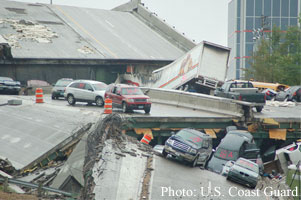Tell Congress: Don’t Waste Money on Highway Expansion
 States should know better than to funnel more money into road expansion at the expense of maintenance.
States should know better than to funnel more money into road expansion at the expense of maintenance.With President-elect Obama back in Washington, action is heating up again around the economic recovery package, which could total up to $850 billion over the next two years. As much as $100 billion may be at stake for transportation projects. How will it be spent? The information that continues to trickle out of state departments of transportation is troubling. With a few exceptions, they are asking mainly to fund roadway expansion projects that would worsen traffic, pollution, and oil dependency, at the expense of transit, bike, and pedestrian infrastructure.
U.S. PIRG just released a great report [PDF] outlining what’s known so far (most states haven’t even gone public with their requests). Here are some updates since the last time we checked in on these wish lists:
- The Texas ask includes a whopping $6 billion for roads (97 percent of the total wish list), including $3.4 billion for expansion projects.
- North Carolina is just as brazen, asking for $5 billion for roads, of which $3.4 billion would fund expansion.
- South Carolina wants to spend nearly all of its $3.2 billion ask on roads, 80 percent on expansion.
- New York pretty much splits the difference between roads and transit, asking for about $1.8 billion for each (the analysis does not break down the road requests by expansion and maintenance)
The best state? Probably Massachusetts, which asked for more transit funding than road funding, absolutely no highway expansion money, and $18 million for bike and pedestrian projects. While one state proves that stimulus spending can signal a shift to more progressive priorities, the report leaves little doubt that the bill can’t give all states a blank check.
Transportation for America has a new petition online urging Congress to impose oversight on states and avoid throwing money down the sinkhole of new highway capacity. This is an important one to speak up on, with big implications for this year’s huge transportation re-authorization package as well as the current stimulus bill. If you want to personalize your letter a bit, check after the jump for some inspiration from a Connecticut state legislator and U.S. PIRG.
From U.S. PIRG’s press release for their new report:
According to incoming Deputy Speaker of the Connecticut House,
Representative David McCluskey, "We have an opportunity to use stimulus
dollars to provide the people of Connecticut with the transportation
alternatives they need for the future. We need to focus on regional and
state-wide projects that will allow Connecticut to grow economically
and in an environmentally conscientious manner. The new Congress and
President need to put their foot down if they will deliver on the
forward-looking Green recovery they’ve promised."The report
calls on Congress, the Obama Administration, and state leaders to apply
the following principles to the writing and implementation of the next
federal economic recovery legislation: (1) Highways should receive no
more funds than the combined total for public transit, intercity rail,
and bicycle and pedestrian projects; (2) Any road funds should go first
to maintenance and repair of structurally deficient bridges and roads,
not new highways or lanes; (3) Public transportation funds should
include support for operations so agencies can accommodate rising
demand. (4) Surface Transportation Program highway funds should be
distributed as under current law so that a portion of resources flow
directly to metropolitan areas that know best about which local
projects are needed; (5) All states, cities, and agencies should
publicly disclose the stimulus lists they have submitted; (6) Direct
recipients of stimulus funds should report on how money was spent and
any transportation spending that it displaced.